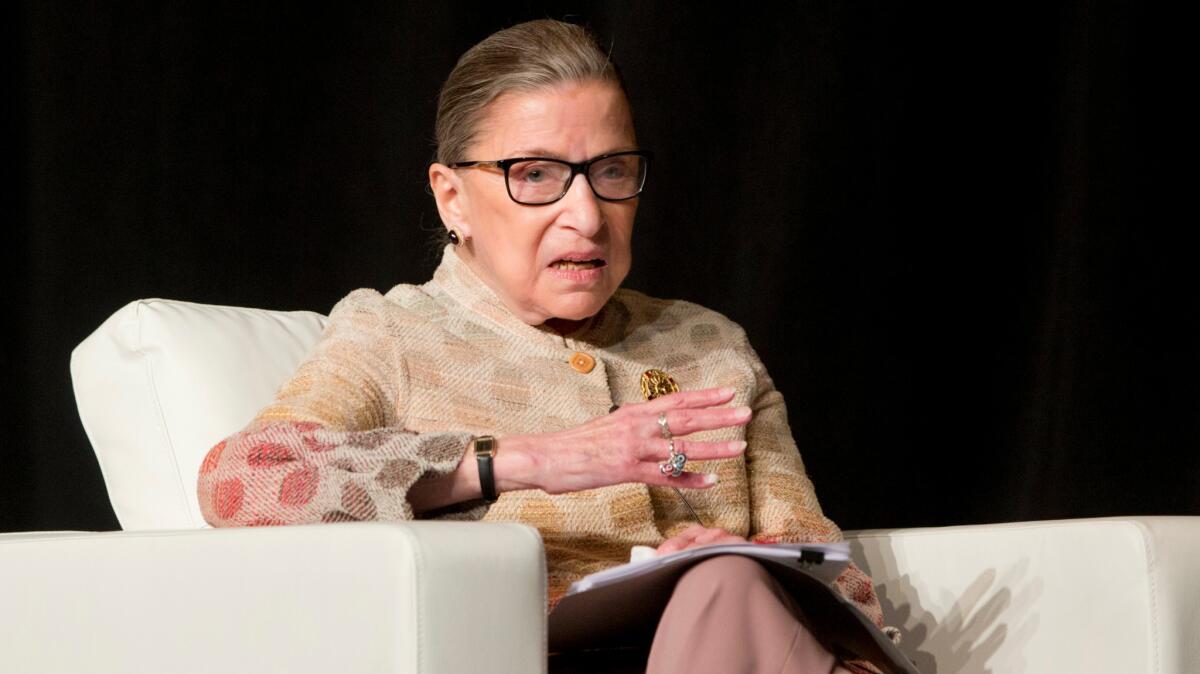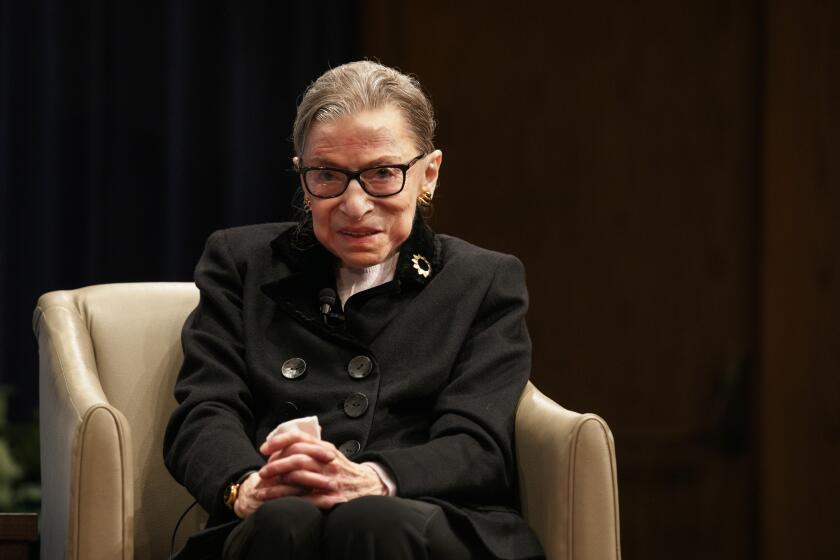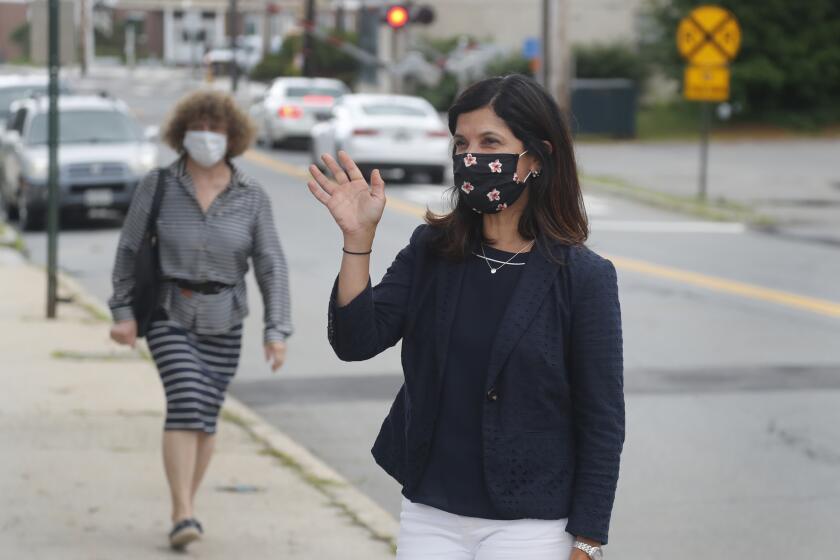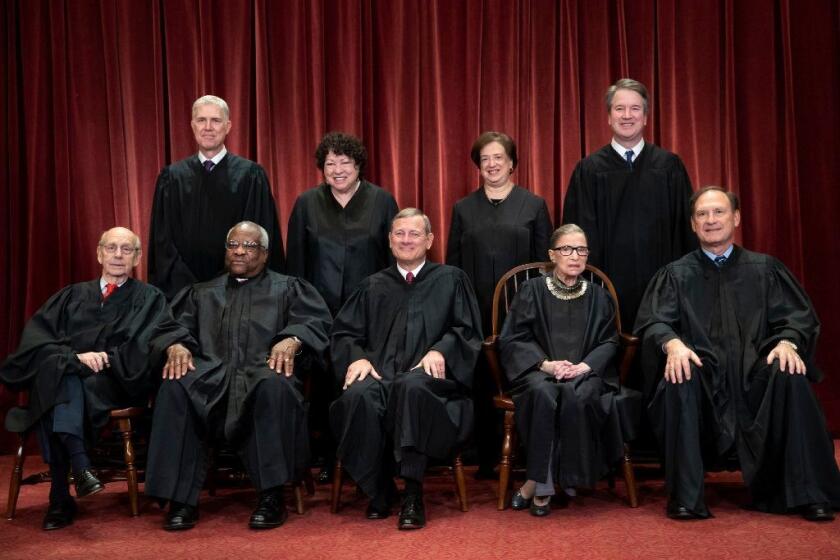Justice Ruth Bader Ginsburg undergoing chemotherapy, says no plans to step down

- Share via
WASHINGTON — Supreme Court Justice Ruth Bader Ginsburg disclosed Friday that she has been undergoing chemotherapy for a recurrence of cancer since May 19, but said she was encouraged because the treatments are “yielding positive results.”
She said she has no plans to step down and can “maintain an active daily routine.”
Justice Ruth Bader Ginsburg said Friday she is receiving chemotherapy for a recurrence of cancer, but has no plans to retire from the Supreme Court.
But the life and health of the 87-year-old justice will remain a matter of intense interest throughout the election year.
President Trump and Senate Majority Leader Mitch McConnell (R-Ky.) have said they would move quickly to replace the court’s senior liberal with a staunch conservative if she leaves the court.
“I can’t imagine that if he had a vacancy on the Supreme Court that he would not very quickly make the appointment and look for the Senate to take quick action,” White House Chief of Staff Mark Meadows said Wednesday when asked what Trump would do if a vacancy occurred.
If a nomination fight developed during the roughly 14 weeks between now and the election, it would galvanize partisans on both sides and put some Republican senators from closely divided states in very difficult positions.
Already, for example, the vote by Sen. Susan Collins (R-Maine) in 2018 to confirm Brett M. Kavanaugh to the court has made her one of the Republicans’ most endangered lawmakers.
The Senate election is increasingly nationalized, and even well-known incumbents face a powerful tide as money pours into Democratic campaigns.
If Democrats win the White House in November and take control of the Senate, a vacancy that occurred after the election could create an even more fraught situation. The lame-duck Senate would remain under Republican control through Jan. 3, 2021, and could confirm a nominee if 50 Republicans agreed to proceed. Whether they would is unknowable.
Ginsburg has survived four bouts with cancer during her 27 years on the court and rarely missed a day when the court was in session.
Last August, she reported that she had undergone radiation treatment for a small malignant tumor in her pancreas. She said the tumor was detected while she was undergoing blood work, and she later proclaimed she was cancer free.
But in Friday’s statement, she revealed the cancer had spread to her liver in February. She also admitted she had withheld the information until she had better news to report.
“My most recent scan on July 7 indicated significant reduction of the liver lesions and no new disease,” she said “I am tolerating chemotherapy well and am encouraged by the success of my current treatment.”
A look at the major Supreme Court rulings of 2020, including on abortion, religion and immigration.
Her colleagues often comment about Ginsburg’s drive and perseverance. She likes to stay up late writing and turns out opinions faster than any of the other justices.
Although she was considered a moderate when President Clinton appointed her to the court in 1993, and had to overcome skepticism from some liberal women’s advocacy groups, she has gained fame and an unusual measure of pop culture notoriety in recent years for her opinions, and especially for her dissents from conservative rulings.
This year, however, she wrote and said little in the court’s most significant cases. Rather, she and her liberal colleagues mostly stood aside while the conservative justices did battle among themselves.
But one of the court’s arguments in May featured an extraordinary moment. Speaking from a hospital room in Baltimore, Ginsburg voiced her irritation with a Trump administration proposal to shield religious employers from the healthcare law that requires providing contraceptives to female employees.
“You are shifting the cost of the employer’s religious beliefs onto the women who don’t share those religious beliefs,” she told Trump’s solicitor general, Noel Francisco. The argument was conducted via a telephone conference between justices and attorneys in response to the coronavirus-related shutdowns.
And she issued a sharp 22-page dissent last week when the court rejected several challenges to the Trump regulation on contraceptive coverage.
“This court leaves women workers to fend for themselves” in “its zeal to secure religious rights,” she wrote.
In Friday’s statement, Ginsburg said she had pledged to “remain a member of the Court as long as I can do the job full steam. I remain fully able to do that.”
After releasing their final opinions of the 2020 term late last week, the justices went on a summerlong recess. They have remained busy this week, however, with a series of emergency appeals involving federal executions and a voting rights case from Florida.
But the court will not formally convene to hear arguments again until the first Monday in October.
More to Read
Get the L.A. Times Politics newsletter
Deeply reported insights into legislation, politics and policy from Sacramento, Washington and beyond. In your inbox twice per week.
You may occasionally receive promotional content from the Los Angeles Times.













